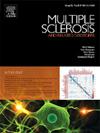Circulating insulin-like growth factor-1 and the risk of multiple sclerosis: a prospective cohort study
IF 2.9
3区 医学
Q2 CLINICAL NEUROLOGY
引用次数: 0
Abstract
Background
Circulating insulin-like growth factor 1 (IGF-1) is positively associated with the risks of certain neurological disorders, including stroke, Alzheimer's disease, and Parkinson's disease. However, the association of IGF-1 with the risk of multiple sclerosis (MS) remains unclear.
Methods
A total of 348,324 participants at baseline were included from the UK biobank in this prospective study. The association of circulating IGF-1 level with MS was analyzed by Cox proportional hazard models. Further, subgroup analyses were conducted to investigate the variables influencing these associations.
Results
Among 348,324 individuals, lower circulating IGF-1 concentrations were associated with a reduced risk of MS (95 % CI, 0.5930–0.9700; P value = 0.02763). The association between lower IGF-1 levels and reduced risk of MS remains robust in older and female participants. Moreover, risk of MS appeared to be lower in IGF-1-low individuals who never smoked, currently drinking alcohol, with higher body mass index, and higher glucose concentrations.
Conclusion
Our findings indicate that a lower concentration of serum IGF-1 was associated with a reduced risk of MS. The results provide evidence that the circulating IGF-1 may play a significant role in the pathogenesis of MS.
求助全文
约1分钟内获得全文
求助全文
来源期刊

Multiple sclerosis and related disorders
CLINICAL NEUROLOGY-
CiteScore
5.80
自引率
20.00%
发文量
814
审稿时长
66 days
期刊介绍:
Multiple Sclerosis is an area of ever expanding research and escalating publications. Multiple Sclerosis and Related Disorders is a wide ranging international journal supported by key researchers from all neuroscience domains that focus on MS and associated disease of the central nervous system. The primary aim of this new journal is the rapid publication of high quality original research in the field. Important secondary aims will be timely updates and editorials on important scientific and clinical care advances, controversies in the field, and invited opinion articles from current thought leaders on topical issues. One section of the journal will focus on teaching, written to enhance the practice of community and academic neurologists involved in the care of MS patients. Summaries of key articles written for a lay audience will be provided as an on-line resource.
A team of four chief editors is supported by leading section editors who will commission and appraise original and review articles concerning: clinical neurology, neuroimaging, neuropathology, neuroepidemiology, therapeutics, genetics / transcriptomics, experimental models, neuroimmunology, biomarkers, neuropsychology, neurorehabilitation, measurement scales, teaching, neuroethics and lay communication.
 求助内容:
求助内容: 应助结果提醒方式:
应助结果提醒方式:


